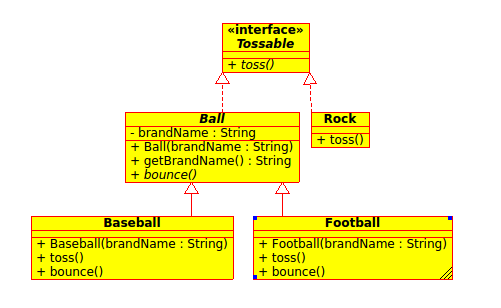
Java Interfaces and UML
Implement the following class hierarchy on paper. You do not need to
fill in the method bodies for the toss
or bounce methods.

Solutions:
public interface Tossable
{
void toss();
}
public abstract class Ball implements Tossable
{
private String brandName;
public Ball(String brandName)
{
this.brandName = brandName;
}
public String getBrandName()
{
return brandName;
}
public abstract void bounce();
}
public class Baseball extends Ball
{
public Baseball(String brandName)
{
super(brandName);
}
public void toss()
{
}
public void bounce()
{
}
}
public class Football extends Ball
{
public Football(String brandName)
{
super(brandName);
}
public void toss()
{
}
public void bounce()
{
}
}
public class Rock implements Tossable
{
public void toss()
{
}
}
Answer the following questions:
- How are abstract classes and interfaces the same?
- Both may include abstract method declarations that inheriting/implementing classes must override.
- Neither can be instantiated.
- Both can be used as types in variable declarations.
- How are abstract classes and interfaces different?
- Classes may inherit from at most one abstract class, while classes may implement any number of interfaces.
- Abstract classes may include method implementations, while interfaces may only include abstract method declarations.
- Why does it generally make more sense to override the
equalsmethod than to overload it?If equals is overridden, then you end up with two equals methods for the same class. Which one gets called will depend on the argument type. This usually isn't the intended behavior. There should only be one notion of equality per class.
- Fill in the following table with one of three values.
- ✓ An object of the indicated type could be stored in a variable of the indicated type.
- X An object of the indicated type could not be stored in a variable of the indicated type.
- — It is not possible to instantiate an object of the indicated type.
Variable Type Tossable Ball Rock Baseball Football Object Type Tossable — — — — — Ball — — — — — Rock ✓ X ✓ X X Baseball ✓ ✓ X ✓ X Football ✓ ✓ X X ✓ - Which of the following will compile (mark with a C)? Which of the following will execute successfully (mark with an E)?
1. Ball ball = new Football("spalding"); // CE 2. Ball ball = new Football("Spalding"); Baseball baseball = (Baseball)ball; // C // This will compile, but an exception will be thrown at run-time. // A variable of type Baseball can never contain an object of type // Football. 3. Object obj = new Baseball("spalding"); // CE 4. Object obj = new Baseball("spalding"); Tossable tossable = obj; // Neither // Tossable is less general than Object. The second assignment would // require a cast. 5. Tossable tossable = new Baseball("spalding"); Object obj = tossable; // CE